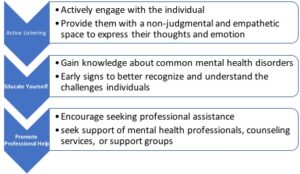The role of parenting extends beyond the physical well-being of children. It also covers the often-overlooked territory of mental health. The ability of parents to provide Mental Health First Aid is a transforming talent that allows them to recognize, comprehend, and respond to indicators of mental health issues in their children.
This blog post digs into the emotional terrain of parental care, revealing how parents can learn and implement Mental Health First Aid with sensitivity and compassion.
“What mental health needs is more sunlight, more candour, and more unashamed conversations.”– Glenn Close (Founder, Bring Change to Mind)
I. Introduction
More often than people realise, mental health issues occur! One in ten Indians may encounter a mental health issue at some point in their lives, and one in twenty will experience depression (NMHS 2016). Mental health issues have a significant influence on our life, much like physical illnesses do. The idea behind Mental Health First Aid is that, just as first aid for physical ailments, people should also acquire basic “first aid” techniques for those exhibiting signs of mental health distress.
II. Understanding Mental Health
Breaking down stigmas
Understanding what Mental Health First Aid entails becomes paramount, as it equips parents with the tools to navigate the delicate nuances of mental health challenges their children may face.
Recognizing signs of mental health struggles in children
Parents play a pivotal role in recognizing the subtle signs that indicate potential mental health struggles in their children. Pay attention to the following key areas:
- Mood Changes:Observe for persistent sadness, irritability, or withdrawal from activities.
- Behavioral Shifts: Watch for increased aggression, difficulty concentrating, or changes in sleep patterns.
- Physical Symptoms: Be alert to unexplained headaches or stomachaches, which can be linked to emotional distress.
- Academic Performance: Note changes in school performance, as a decline may indicate underlying struggles.
- Social Withdrawal: Pay attention if a child becomes increasingly isolated or expresses feelings of hopelessness, as this may signal mental health challenges.
From changes in behavior to shifts in academic performance, being attuned to these signals enables early intervention.
The impact of parental involvement
Active parent involvement in Mental Health First Aid (MHFA) organisation is paramount for creating a supportive environment for children facing mental health challenges. Parents who engage in MHFA training gain essential skills to recognize early signs of mental health struggles, provide initial assistance, and guide their children toward professional help if needed. This involvement not only equips parents with the tools to address immediate concerns but also fosters open communication about mental health, reducing stigma, and creating a safe space for children to express their feelings. The ongoing support and understanding from involved parents significantly contribute to a child’s mental well-being, reinforcing resilience and promoting early intervention for sustained mental health.
III. Learning Mental Health First Aid Techniques
Recognizing common mental health disorders
Understanding common mental health disorders equips parents with the knowledge to identify potential issues in their children. This section provides insights into recognizing disorders and their early signs like:
- Anxiety Disorders: These disorders, such as generalized anxiety disorder, social anxiety disorder, and panic disorder, involve excessive worry, fear, or nervousness that can interfere with daily life.
- Depressive Disorders: Conditions like major depressive disorder and persistent depressive disorder involve persistent feelings of sadness, hopelessness, and a lack of interest or pleasure in activities, affecting overall mood and functioning.
- Attention-Deficit/Hyperactivity Disorder (ADHD): ADHD is characterized by persistent patterns of inattention, hyperactivity, and impulsivity, impacting a child’s ability to focus, organize tasks, and regulate behavior.
Practical strategies for offering support
Learning practical strategies for offering support is the crux of Mental Health First Aid.

V. Success Stories
Real-life examples of parents implementing Mental Health First Aid
Narratives of real-life parents successfully implementing Mental Health First Aid offer inspiration and insight into the positive outcomes achievable through dedication and understanding.
Speak (Short Film on Mental Health)
Positive outcomes and impacts on school dynamics
If the Mental Health First Aid, when applied successfully, can positively impact school dynamics, creating an atmosphere of trust, understanding, and mutual support.
Books:
- “The Anxiety Workbook for Teens” by Lisa M. Schab: A practical guide for teens dealing with anxiety, offering exercises and strategies for managing stress.
- “Mindset: The New Psychology of Success” by Carol S. Dweck: Explores the concept of mindset and how it affects one’s approach to challenges and learning.
-
“You Are a Badass: How to Stop Doubting Your Greatness and Start Living an Awesome Life” by Jen Sincero: A motivational book encouraging self-discovery and confidence-building.
Workshops:
- Mindfulness Workshops: These workshops teach students techniques for staying present, reducing stress, and improving mental well-being.
- Resilience Training: Workshops focused on developing resilience skills to help students cope with setbacks and challenges.
- Emotional Intelligence Workshops: Sessions that enhance emotional awareness and teach skills for managing emotions in a healthy way.
Online Resources:
- Therapy Assistance Online (TAO): Offers interactive, self-guided therapy modules to help students with various mental health concerns.
- Calm: An app providing guided meditation, sleep stories, and relaxation exercises to promote mental wellness.
- JED Foundation: Online resources covering mental health, suicide prevention, and emotional well-being for college students.
- National Alliance on Mental Illness (NAMI) on Campus: Provides information, support, and resources for students facing mental health challenges.
- PsychCentral: An online mental health resource offering articles, quizzes, and information on various mental health topics.
These resources can contribute to a comprehensive approach to mental health support for students, encompassing literature, practical workshops, and accessible online tools.
VII: Conclusion:
In conclusion, learning Mental Health First Aid as parents is not just a skill; it’s a transformative journey toward creating a supportive and understanding environment for our children. By gaining insights into recognizing signs of mental health struggles, understanding their impact, and adopting practical strategies for support, parents become valuable allies in their children’s mental well-being. The power of active listening, educating oneself, promoting professional help, regular check-ins, and fostering a supportive environment can make a significant difference. Ultimately, the commitment to ongoing learning and open communication is the cornerstone of effective Mental Health First Aid for parents, ensuring that our children grow up in an atmosphere where their mental health is prioritized and nurtured.
Read More:https://healwellsurgitech.com/10-benefis-of-tulsi/
Disclaimer: The content participated in the blog posts is for information purpose only. The purpose of content, visuals and images and other accoutrements of the website are to promote broad consumer understanding and knowledge of health related motifs. It isn’t intended to be a cover for any of the treatment, judgement or medical advice. Always seek the advise of good healthcare provider with any questions, no way disregard professional medical advice just on the base of information shared on the website.
How to handle menta health?
Have various exercise
Make sleep a priority
Try a relaxing activity
Set goals and priority
How can mental health affect us?
Mental health can cause difficulties in all aspects of the life which include the relationship in friends, family and community. This can result issues in problem in school and at work.




Thank you, Hope you find this interesting